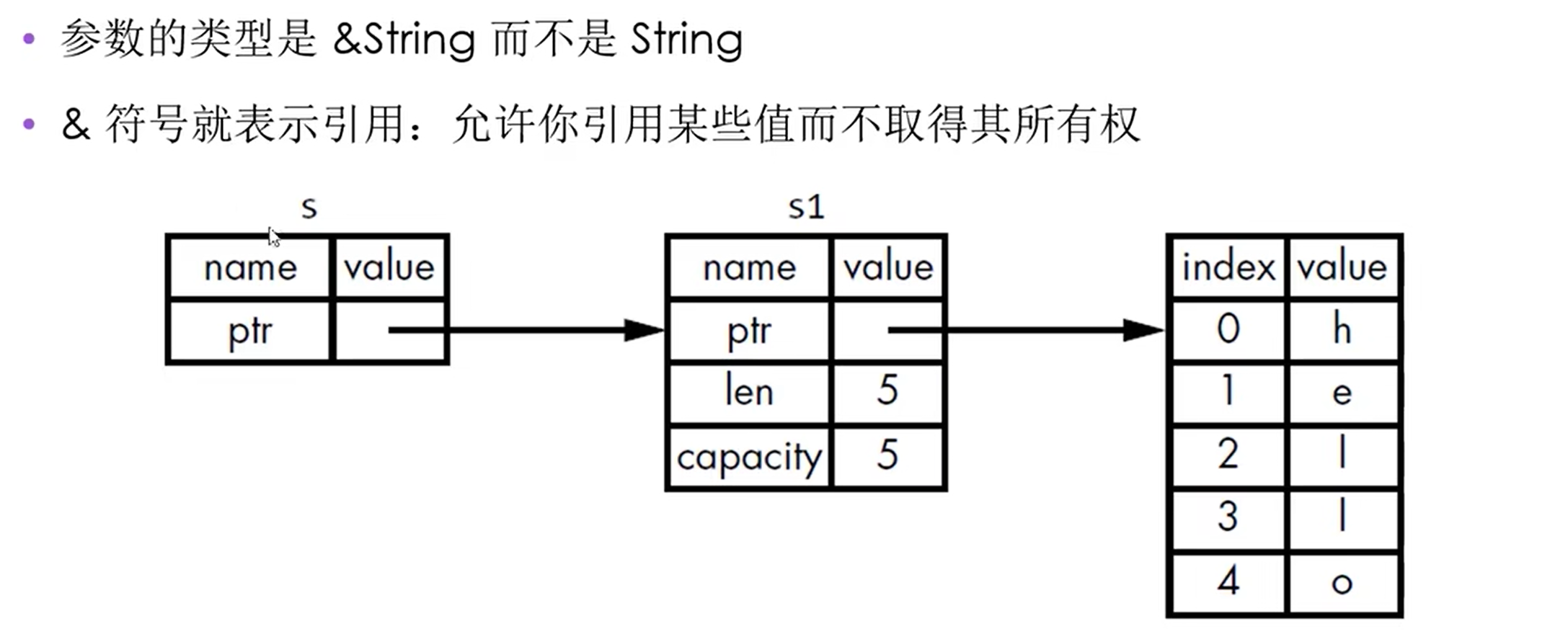Rust Tutorial 2: Rust Ownership
Rust Ownership
Introduction
所有权机制
- 一些程序语言的垃圾收集器会自动收集不再使用的内存(Java, Python),这样的垃圾回收机制会带来性能上的额外开销(例如Stop The World,在这个阶段所有应用程序线程的执行都会被暂停)
- 一些程序语言需要程序员手动进行内存管理。(C++的手动 new 和 delete)
Rust使用所有权系统来管理内存,并且不会带来额外的运行开销。(因为内存的检查和管理在编译时就已经完成)
栈内存和堆内存
- 栈内存(栈帧空间),LIFO
- 所有存储在栈上的数据必须具有已知并且固定的大小。
- 堆内存
- 在堆上进行内存分配(寻找可用的空间并且标记指针,这个指针可以存储在栈上)
- 访问堆内存会更加慢(因为需要指针间接跳转访问)
在C++中,我们经常在堆内存中为程序分配内存,并且需要手动删除,因此所有权需要解决的问题主要就集中在堆内存的分配和管理上,即跟踪代码的哪些部分使用了 heap 的哪些数据,并且需要清理 heap 中的数据来避免空间不足的问题。
即进行垃圾回收的机制(但是是在编译时执行)
所有权规则
- 每个值都有一个变量,该变量是该值的所有者。
- 每个值同时只可以拥有一个所有者。
- 当所有者超出作用域(Rust)的时候,该值将会被删除。
- 对于第三点,当所有者超出自身作用域的时候,内存会立即被交换给操作系统。(这一点和C++不同)
String in Rust
字符串字面值是不可变的,因为变量的值在编译时确定,因此,Rust 专门设计了可变的 String 类。对于一个String类的变量,程序会在内存中储存三个信息:ptr, length and capacity,这三个信息本身储存在栈内存中。而指针所指向的具体的内存(就是实际的data)是分配在堆内存中的。
使用 String::from 的时候,他会在运行时向内存分配器请求分配内存(这一点与字符串字面值不同)。当变量离开作用域之后,会自动调用 drop 函数来自动释放内存(类似于 C++ 中的资源获取即初始化,RAII)。
深拷贝、浅拷贝和移动语义
在 C++ 中,存在深拷贝和浅拷贝的区别,简单来说,任何包含指向动态分配内存的指针的类型,如果不对其进行特殊处理(即不自定义拷贝构造函数和拷贝赋值运算符),那么它就会执行默认的浅拷贝,即只拷贝指针变量的值(地址),而并不是对指针所指向的变量做复制。
-
对于 Rust 来说,浅拷贝是绝对不允许的。实际上在 C++ 中,浅拷贝现象也会导致悬空指针或者二次 delete 等问题,是内存泄漏的重要原因之一。Rust的核心宗旨之一就是物皆有主:每一个值同时只可以拥有一个所有者。
-
深拷贝本身更加的安全,但是会额外分配资源,因此如果你需要创建一个独立的、在堆上拥有自己数据的副本,必须显式地调用
.clone()方法。
在 Rust 中,所有权规则有一个例外:对于一些存储在栈上的、大小固定的简单类型,它们在赋值时会发生复制,而不是所有权转移。这些类型实现了 Copy trait,这意味着它们在赋值时,会直接复制底层的值,而不是移动所有权。
在现代 C++ 中引入了移动语义的概念,即在避免复制的情况下完全移交所有权给对应变量,这样高效地解决了同一块内存被两个指针同时指向(浅拷贝带来的问题)的隐患。Rust 于是借用了这样的机制,这也是 Rust 对储存在堆内存上变量的核心机制之一:移动。
- 当你将一个变量(比如一个
String)赋值给另一个变量时,Rust 默认不会像 C++ 那样进行浅拷贝,而是会将这个变量的所有权转移给新变量。例如下面的代码,在 s2 的作用域上,let s2 = s1,s1变量的值的所有权发生了转移,此时再次调用 s1 就会报错,因为 s1 已经不再有对变量的所有权。
从安全性的角度考虑,Rust 希望值和变量是严格绑定的,杜绝浅拷贝现象的发生。而移动语义的机制也实现了这一点,可以让开发者迅速的定位到哪里有着非法的操作,而不是等到程序写完了出现 Segmentation Fault。
1 | |
Clone
可否进行补救?当然可以,Rust提供了 .clone() 函数来实现深拷贝。
1 | |
在 Rust 中,所有权规则有一个例外:对于一些存储在栈上的、大小固定的简单类型,它们在赋值时会发生复制,而不是所有权转移。这些类型实现了 Copy trait,这意味着它们在赋值时,会直接复制底层的值,而不是移动所有权。
例如下面的程序可以正常执行:
1 | |
Copy Trait
在 Rust 中,Copy Trait 是一个核心概念,它决定了类型在赋值时是执行移动(Move)还是复制(Copy)。
Copy Trait 标志着一个类型可以被简单地复制,而不会发生所有权转移。当一个类型实现了 Copy Trait,它的变量在赋值或作为函数参数传递时,会直接在栈上进行按位复制,而不是所有权移动。
这通常适用于那些存储在栈上、大小固定且不拥有任何堆上资源的类型。理论上,只有所有成员都储存在栈上的类型才能实现 Copy Trait,而不可以拥有需要 Drop Trait 管理的堆内存资源。
因为 Copy Trait 是直接在栈内存上的快速按位复制,不涉及堆内存的操作,因此开销极低。
如果涉及堆内存,那在栈上会有一个指针存储指向堆内存的相关地址,而这个指针就会在 Copy Trait 中被复制,而堆内存不会被复制,又回到了浅拷贝出现的问题上。
你可以通过为你的 struct 或 enum 派生(derive)Copy Trait 来实现它。
要实现 Copy Trait,一个类型必须满足两个条件:
- 所有成员都必须实现了
CopyTrait。 - 它不能拥有析构函数(
DropTrait)。 因为如果一个类型实现了Drop,它就需要在离开作用域时执行特定的清理操作。如果它能被复制,那么就有可能导致重复的清理,这会破坏内存安全。
Drop 方法是用于自动释放堆内存的,栈内存的释放是根据 LIFO 规则自动释放的。
例如,下面这个 Point 结构体可以派生 Copy Trait,因为它的两个成员 x 和 y 都实现了 Copy:
1 | |
相反,下面这个 Container 结构体就不能实现 Copy Trait,因为它包含了一个 String 成员,而 String 类型没有实现 Copy:
1 | |
Copy Trait 和 Clone Trait
这两个 Trait 经常被一起讨论,但它们的用途不同:
CopyTrait:用于隐式的按位复制,开销极低。它发生在赋值和传参时,是 Rust 的默认行为之一。CloneTrait:用于显式的深拷贝。当你需要创建一个独立的、拥有自己堆上数据副本时,必须调用.clone()方法。
一个类型只有实现了 Clone Trait 才能实现 Copy Trait,因为 Copy 是 Clone 的一个特殊情况。因此,在派生 Copy 时,通常也会派生 Clone。
所有权与函数
本质上和变量赋值完全类似,可以进行移动或者复制。
- 对于Copy Trait,函数的传参就是复制的过程,不会影响原变量的内容。
- 但是对于非 Copy Trait,就相当于C++中的&&右值引用,直接交出了变量的所有权。
函数的返回值也是如此。返回值也可以发生所有权的转移。
引用和借用
要么全是不可变引用,要么只能有一个可变引用
引用的生命周期不可以超过数据的生命周期
Rust所有权机制设计的初衷是保证内存安全,但是这样的设计会带来非常大的麻烦,尤其是在面对函数的反复传参的过程中。我们来看下面的代码:
1 | |
程序果不其然的报错了,因为在函数传参的时候,main函数作用域里的s1就已经被“销毁”了(或者说没有控制权了),而控制权被转移到了函数体内部的临时变量上,出函数之后离开作用域,这个字符串被释放。
我们可以有以下几种方式避免这一种错误:
首先就是使用.clone()函数再拷贝一份(但这会带来效率上的下降)
1 | |
同样,我们也可以修改函数的参数和返回值列表,让对应的临时变量返回所有权。但是这样会导致函数接口的变化,并且难以应对函数参数列表比较复杂且庞大的现象。
1 | |
Rust还实现了第三种方式,即在函数内部(临时作用域)中进行变量的借用。(有点类似于C++中的reference)
引用
Definition:允许你取得某些值但不获得所有权。
1 | |
引用的本质就是一个指针!

这样就可以保证临时变量在走出作用域的时候,因为没有所有权所以内存不会被回收。
但是我们不可以修改借用的东西!(const T&)
可变引用
1 | |
- 使用
&mut。 - 可变引用有一个非常重要的性质:在特定的作用域内,对于同一块数据,只允许存在一个可变的引用。(防止数据竞争)
- 不过可以在不同的作用域内(不同时)
1 | |
报错:
1 | |
- 不可以同时拥有一个可变引用和一个不可变引用。(允许只存在多个不可变的引用或者唯一一个可变引用)
数据竞争(Data Race)是一种在并发编程中常见的、严重且难以调试的错误。它发生在多个线程或进程同时访问共享数据时,并且至少有一个访问是写入操作,而这些访问没有通过同步机制进行协调。
数据竞争的发生必须同时满足以下三个条件:
- 并发访问:至少有两个或更多线程或进程在同时运行。
- 共享数据:这些线程或进程访问了同一块共享内存区域。
- 至少一个写入:至少有一个访问是写入操作(修改数据)。如果所有访问都是读取,则不会发生数据竞争。
- 缺乏同步:这些访问操作没有使用互斥锁、信号量或其他同步原语来保证其原子性和有序性。
当数据竞争发生时,程序的行为变得不可预测,可能导致以下严重问题:
- 结果不一致:最终结果可能取决于线程执行的顺序。例如,两个线程同时对一个变量进行
++操作,最终结果可能是+1而不是预期的+2。 - 程序崩溃:一个线程可能正在读取数据,而另一个线程正在修改或释放同一块数据,导致读取到无效数据(野指针)并引发崩溃。
- 死锁或活锁:间接导致更复杂的同步问题。
- 难以调试:数据竞争是时序相关的错误,它可能只在特定的线程调度顺序下出现,而且很难复现。
Rust 的所有权机制从根源上杜绝了数据竞争现象的出现。
悬空引用 (Dangling References)
在C++中,存在Dangling Pointer的概念,即一个指针指向了内存中的某个有效地址,而该内存被释放之后指针本身的值(所指向的地址)并没有发生变化,但此时指向了一块无效的内存,产生严重的错误,并且这个错误不会被编译器检查到。
1 | |
程序输出:
1 | |
但是在Rust中,可以保证不存在悬空引用,因为引用在离开作用域之前数据都不会离开作用域。
1 | |
在函数内部的变量 s 在函数返回时交出了自己的应用(注意思考应用的本质:是一个指针!),但是在函数结束时 s 会立刻调用 drop trait(离开作用域)而导致堆内存释放,因此,此时返回的应用指向了一块无效的堆内存。(就是 C++ 的悬垂指针)
这个问题是非常严重的,会打破 Rust 的安全性,因此,Rust 会在编译时杜绝这个行为,即引用在离开作用域之前数据都不会离开作用域。换句话说,引用的生命周期不能超过其所引用的数据的生命周期。(在这里我们需要把值的所有权移交)
1 | |
Slice
Slice 是一种特殊的引用,允许引用集合中一段连续的元素序列,而不是应用整个集合。方便高效的查看字符串的数据。
1 | |
Slice 是使用依然要遵守相关引用的规则。
这段程序会报错,因为发生了数据竞争,同时出现了可变引用和不可变引用。
1 | |
但是这段程序不会,在创建这两个引用之前,test_slice 已经完成了它的任务,并且它的生命周期在理论上已经结束了。因此,当创建 s_1 和 s_2 这两个不可变引用时,可变引用已经不再活跃。
1 | |
字符串的字面值就是 slice